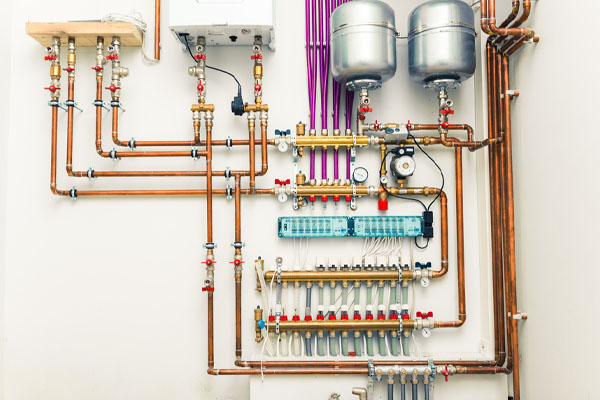Understanding the critical distinctions between popular heating systems is essential for staying warm and cozy during the chillier seasons. Hydronic and forced air units are top choices, each bringing distinct benefits and operating styles. Opting for the most suitable system can significantly enhance your home’s energy efficiency, comfort, and overall cost-effectiveness over time. Tevis Energy, renowned for its dedication to customer comfort and energy solutions, provides expert advice and professional installation services tailored to each homeowner’s unique requirements. In this article, we’ll explore the differences and similarities between forced air vs hydronic heating systems.
Forced Air & Hydronic Systems: Detailed Analysis for Optimal Home Heating

Deciphering the distinctions between forced air and hydronic heating systems is crucial in selecting the ideal heating solution for your home. Each type of system offers unique attributes that influence factors such as comfort, energy efficiency, and overall expenses. This detailed examination of their traits, advantages, and drawbacks will guide you in determining the most suitable heating option that aligns with your household’s particular demands and preferences.
Rely on Tevis Energy for Your Heating Solutions: Ensure your home remains cozy and efficient with Tevis Energy’s premier heating services. Contact us now!
Introduction to Forced Air Heating Systems
Forced air heating utilizes a furnace to warm air that is subsequently circulated through a home using a network of ducts and vents. This category includes gas, electric, and oil furnaces, each providing different efficiency levels and fuel choices. The process begins with the system pulling in cool air, heating it within the furnace, and then employing a blower to distribute the heated air throughout the rooms via the ductwork.
Benefits of Forced Air Heating

- Rapid Warming: Forced air heating systems excel at swiftly heating homes. They rapidly warm the air in the furnace and disperse it through the ductwork, delivering immediate comfort.
- Dual-Purpose Ductwork: The ducts utilized for heating are also compatible with central air conditioning systems, providing an economical and efficient option for comprehensive climate control throughout the year while streamlining HVAC installations.
- Enhanced Air Quality: As air circulates through the system, it passes through filters that trap dust, pollen, and other allergens, significantly improving indoor air quality and fostering a healthier living environment.
- Economical Installation: Forced air systems are generally more cost-effective to install, particularly in homes already equipped with ductwork. This makes them a more budget-friendly option compared to systems necessitating extensive new infrastructure.
Choose Tevis Energy for Reliable Heating Services: Ensure your home stays comfortable and efficient with Tevis Energy’s trusted expertise. Reach out to us today!
Challenges of Forced Air Heating
- Sound Concerns: The operation of forced air systems often generates noise from the blower and air movement through ducts, potentially disturbing the peace in quieter zones of the house.
- Uneven Temperature Distribution: Problems with airflow, such as leaks or obstructions in the ductwork, can create uneven heating, resulting in areas that are either too hot or too cold within the home.
- Ongoing Maintenance: Forced air systems require regular upkeep to preserve efficiency and a steady level of comfort. This includes changing filters and sealing ducts; failure to maintain the system properly can cause diminished performance.
Introduction to Hydronic Heating Systems

Hydronic heating systems harness water or steam to distribute heat across a home, providing warmth through radiators, baseboard heaters, or beneath-the-floor piping. This category features options like radiant floor heating, which emanates heat from below for an evenly warm surface, and baseboard heating, which pushes warmth out through units mounted along the walls.
Depend on Tevis Energy for All Your Heating Needs: Experience a warm, energy-efficient home with Tevis Energy’s expert solutions. Contact us now!
Benefits of Hydronic Heating
- Uniform Heat Dispersal: Hydronic heating provides steady, uniform warmth throughout a residence, reducing temperature fluctuations and removing cold zones.
- Silent Functioning: Operating without the need to push air through ducts, hydronic heating offers a quiet solution, ensuring a disturbance-free environment.
- Enhanced Energy Efficiency: Hydronic systems are known for their efficiency, especially in radiant floor setups. They often use less energy while maintaining comfortable indoor temperatures.
- Better for Allergies: Since hydronic heating doesn’t involve air circulation, it minimizes the distribution of dust and allergens, making it a great choice for individuals with allergies or respiratory concerns.
Challenges of Hydronic Heating

- Gradual Warm-Up: Hydronic systems typically require more time to heat an area than forced air systems due to their reliance on slow heat transfer via water or steam.
- Lack of Cooling Capability: Hydronic systems cannot offer cooling without built-in ductwork, necessitating a separate air conditioning unit.
- Elevated Installation Expenses: The setup of hydronic heating, especially systems like radiant floor heating, involves higher initial costs and may need significant modifications in already constructed homes.
Look to Tevis Energy for Exceptional Heating Expertise: Secure maximum comfort and efficiency with Tevis Energy’s dependable services. Contact us now!
Crucial Considerations for Deciding Between Forced Air and Hydronic Heating

Certain critical elements should influence your choice between forced air and hydronic heating systems to guarantee optimal efficiency and comfort in your residence.
- Energy Conservation: Forced air units might utilize more energy due to possible air escape through ducts, whereas hydronic systems typically provide superior energy conservation, especially in setups like radiant heating that demand less energy for maintaining stable temperatures.
- Home Layout and Retrofitting Considerations: Hydronic heating is often best suited for new construction or significant renovations due to its demanding installation needs. Conversely, forced air systems are typically simpler and more economically feasible to retrofit into existing homes that already have ductwork in place.
- Indoor Air Quality Factors: If improperly maintained, forced air systems might spread allergens and dust particles. In contrast, hydronic systems do not propel air around the home, presenting a preferable option for individuals with allergies or respiratory conditions.
- Heating System Expenses: The upfront cost for installing forced air systems is generally lower, particularly in homes with ductwork. However, hydronic systems may lead to long-term financial savings due to lower energy usage and minimal maintenance requirements.
- Comfort Considerations: Homeowners’ preferences regarding noise levels, steady temperature maintenance, and air movement play a crucial role in determining the selection between these two types of heating systems.
Rely on Tevis Energy for Unmatched Heating Solutions: Enjoy consistent warmth and efficiency with Tevis Energy’s customized services. Call now!
FAQs About Forced Air vs Hydronic Home Heating Systems

What Is the Yearly Maintenance Needed for Forced Air and Hydronic Systems?
Forced air heating necessitates consistent filter replacements (every one to three months), ductwork repairs, and a yearly furnace examination. In contrast, hydronic systems demand less regular maintenance, involving annual inspections of the boiler, valves, and pumps and periodic assessments for leaks or pressure discrepancies.
Is It Possible to Convert a Forced Air System to a Hydronic System?
Yes, although transitioning from a forced air to a hydronic heating system can be intricate and expensive. This conversion typically includes removing existing ducts, setting up new piping, and integrating radiators or underfloor heating, often best suited for implementation during extensive renovations or new building projects.
How Do Forced Air and Hydronic Heating Affect Indoor Humidity?
Forced air heating systems are known to decrease indoor humidity levels, particularly during the colder months, sometimes necessitating the use of a humidifier to restore moisture. Conversely, hydronic heating does not alter indoor humidity, providing a steadier atmosphere and potentially better indoor air quality.
Opt for Tevis Energy for Premier Heating Services: Keep your home cozy and energy-efficient throughout the year with Tevis Energy’s committed solutions. Reach out today!
Can You Implement Zoning with Forced Air and Hydronic Heating Systems?
Indeed, zoning is feasible with both heating types, though the methods vary. Forced air systems use dampers within the ductwork to manage air distribution to specific areas, enabling customizable climate control. For hydronic systems, zoning is typically more straightforward, involving the installation of separate circuits for various rooms or zones, which enables more precise temperature adjustments.
Which Heating System Performs Better in Colder Environments?
Hydronic heating systems are generally more robust and efficient in cold climates, offering stable and continuous warmth. In contrast, forced air systems may experience significant heat loss through ducts in colder areas, often necessitating increased energy usage to achieve desired indoor temperatures.
Conclusion: Deciding on the Ideal Heating System for Your Home
The choice between forced air and hydronic heating systems hinges on your household’s specific needs and preferences. Forced air systems are favored for their rapid heating capabilities, more affordable installation, and compatibility with central air conditioning, though they may introduce noise and uneven temperatures. On the other hand, hydronic systems are known for their quiet operation, uniform heat distribution, and greater energy efficiency. Still, they require a higher initial investment and heat spaces more gradually.
Consulting with a seasoned HVAC provider like Tevis Energy ensures that you receive tailored advice that aligns perfectly with your home’s unique requirements, aiding you in selecting the most effective system to enhance comfort and efficiency.
Tevis Energy’s sister company, Modern Comfort, performs HVAC installations, heating and cooling replacements, repairs, tune-ups, and more. Our technicians can provide expert HVAC services to ensure that your system provides the comfort and efficiency you deserve. Contact us now to schedule an appointment.
Reach Out to Tevis Energy for All Your HVAC Needs
Tevis Energy provides exceptional heating and cooling services across central Maryland and southern Pennsylvania. Our professionally certified and experienced technicians specialize in various HVAC services, including tune-ups, repairs, installations, replacements, and more. With extensive knowledge, our team ensures your HVAC system is serviced efficiently and effectively.
At Tevis Energy, we are committed to offering the best rates for heating and cooling services in the area. Our maintenance services can help maximize comfort, improve energy efficiency, and lower overall energy bills. If you’re facing a repair or need a system replacement, we’ll help you choose the perfect solution that fits your home and budget.
All our services come with a satisfaction guarantee. Contact Tevis Energy today to schedule an appointment or book a free, in-home consultation. Call now!
You can click here to contact us now or call us at (410) 876-6800 to find out more! Click the link to view our service area.

Related Articles:
